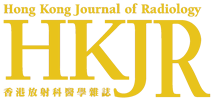Emerging Novel Therapies in Recurrent Ovarian Cancer: Anti-angiogenesis
E Pujade-Lauraine
Hong Kong J Radiol 2013;16(Suppl):S4-8
Ovarian cancer is the leading cause of gynaecological cancer death in Hong Kong. It is often diagnosed late due to the absence of a means for routine screening. Up to 75% of patients relapse in spite of good initial response to platinum therapy. The patient response to chemotherapy in recurrent ovarian cancer can be predicted by the length of the platinum-free interval. Following relapse, chemotherapy is the standard of care, with response rates typically in the range of 17 to 31%; however, there have been few advances in chemotherapeutic agents in recent years. In comparison, an increasing number of anti-angiogenesis agents have been developed and investigated, based on the rationale that vascular endothelial growth factor (VEGF) — the driving force behind angiogenesis — is implicated in all stages of pathogenesis in ovarian cancer. Bevacizumab is a recombinant humanised monoclonal antibody of the immunoglobulin G1 isotype with high specificity and affinity for VEGF, resulting in potent VEGF-neutralising activity. It was the first anti-angiogenesis agent to be tested in ovarian cancer in phase III randomised clinical trials, both as first-line (GOG128 and ICON7) and second-line therapy (AURELIA and OCEANS). These trials demonstrated definitively the activity of bevacizumab in ovarian cancer, proving the concept that anti-angiogenesis is a viable and effective treatment option in ovarian cancer. Other classes of antiangiogenesis agents currently under investigation that have shown early promise include the VEGF receptor / multi-target tyrosine kinase inhibitors and anti-angiopoietins.
中文摘要
復發性卵巢癌的新興療法:抗血管生成
E Pujade-Lauraine
卵巢癌是香港婦科癌症死亡率最高的癌症。由於缺乏常規篩查,卵巢癌往往被遲診。儘管患者對鉑類治療有良好的初步反應,可是高達75%的患者仍會復發。復發性卵巢癌患者對化療的反應可以由「無鉑時段」的長短來預測。化療是復發性卵巢癌的治療標準,患者的反應率一般介乎17%至31%,可是近年化療藥物的進展有限。相對而言,越來越多的抗血管試劑已被開發和在研究中試驗,這些都是基於血管內皮生長因子(VEGF),即血管增生的驅動力,牽涉於卵巢癌各階段的發病機制中。貝伐單抗(bevacizumab)是免疫球蛋白G1同種型的重組人源化單克隆抗體,具有高特異性和VEGF親和力,從而能中和VEGF。貝伐單抗成為首個臨床試驗的抗血管試劑,在卵巢癌的III期隨機臨床試驗作為一線(GOG128和ICON7)和二線治療(AURELIA和OCEANS)。這些試驗明確顯示貝伐單抗在卵巢癌的效用,證明抗血管生成是卵巢癌的一種可行及有效的治療。目前經已初見成效的其他抗血管生成劑包括血管內皮生長因子受體/多靶點酪氨酸激酶抑製劑和抗血管生成素。

